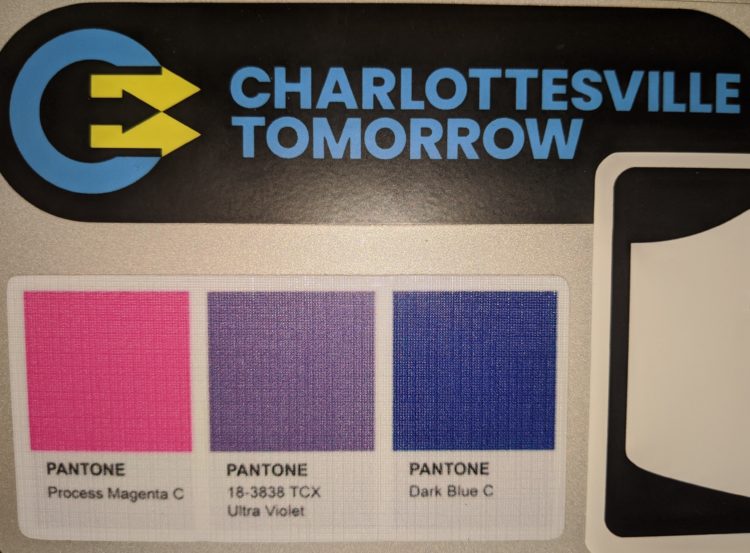In September 2012, Charley Burton was interviewed by a reporter while staffing a table for Black Transmen Inc., an advocacy organization of which he is a founding board member, at Charlottesville Pride. When he came into work that Monday, he found the article on the break room table. He recounted being approached by an older lady in the break room, who said she would pray for his soul.
“That’s when I knew something was up,” Burton said.
By the end of the day, he was fired.
“I was told I was let go because productivity was down and they were going to revamp things,” Burton added, noting that he had been working at the job for a little more than two years and was probably one of their top performers. “I was a salesperson at the time, and my commission checks were always bigger than my take-home pay.”
A few months later, Burton heard from one of his former co-workers that the business had hired someone a few days later in the exact same spot.
Burton said that he has since taken jobs for which he has to travel back and forth to Richmond, rather than work in Charlottesville. He explained that he feels safer in the anonymity of a bigger city.
“People are surprised to hear stories like Charley’s, and yet we’ve seen it happen almost every festival we’ve had,” said Amy Sarah Marshall, the president of Charlottesville Pride Community Network, at a June 23 online panel. “Somebody gets outed, whether it’s in the paper or some other venue, and walks in [to work] the next day to find out they don’t have a job. … This was completely legal to do.”
Changes in the law

The Executive Mansion during the 2019 reception for Pride Month. The Virginia Values Act, which prohibits discrimination in public and private employment, credit, housing and public accommodations on the basis of sexual orientation and gender identity, goes into effect on July 1, 2020.
Credit: Jack Mayer/Office of the Governor
Earlier this month, the U.S. Supreme Court ruled that under Title VII of the Civil Rights Act — which prohibits employer discrimination on the basis of sex, among other protected categories — an employer cannot fire an individual on the basis of sexual orientation or gender identity, stating that sex is necessarily factor in these forms of discrimination.
This ruling marks the first explicit federal ban on firing employees on the basis of sexual orientation or transgender status.
In its state law, Virginia currently has no explicit protections from employment discrimination on the basis of sexual orientation or gender identity. However, the Virginia Values Act, which becomes law this Wednesday, prohibits discrimination in public and private employment, credit, housing and public accommodations on the basis of sexual orientation and gender identity, among other additional protected categories.
While these changes mark progress for LGBTQ+ workers, there are still obstacles discrimination claims will face.
Kim Forde-Mazrui, a University of Virgina law professor, explained that the Supreme Court ruling directly protects people only against disparate treatment on the basis of sexual orientation or transgender status, though he said it seems likely that their reasoning opens the door to disparate impact claims on the basis of these categories, as well. Forde-Mazrui said disparate treatment claims put the burden on the plaintiff to prove the discrimination was intentional.
“It’s very difficult to prove intent. That’s the downside of disparate treatment claims,” he said.
Forde-Mazrui added that proving intent becomes harder the longer a form of discrimination has been illegal. He explained that when Title VII first took effect in 1965, one could more often point to recent open sexism or racism of an employer to prove current intentional discrimination on the basis of sex or race.
“After about five years, I imagine, just like we see with race and sex, employers are going to always think ahead and come up with a neutral reason to cover their tracks. It doesn’t mean [proving intent will be] impossible. It just makes it more difficult,” he said.
Action for workers and employers

A stylized bisexual pride flag is among stickers on News Editor Elliott Robinson's computer.
Credit: Elliott Robinson
At the June 23 panel, which focused on answering questions about the Virginia Equality Act, LGBTQ+ community leaders shared information about how workers can seek justice and employers can promote equality.
Vee Lamneck, the executive director of the LGBTQ+ advocacy organization Equality Virginia, recommended that victims of discrimination keep a written record detailing everything that happened, and who witnessed it, in a secure place that is not their workplace, along with copies of any digital or physical documents related to the incident. This information and more can be found in Equality Virginia’s FAQ sheet on the Virginia Values Act. Additionally, on their website, Equality Virginia lists local law firms specializing in the needs of the LGBTQ+ community.
Lisa Green, a Charlottesville Pride Board Member and another of the panelists, expressed the need to make sure those without financial means have the information and resources they need to defend themselves in incidents of discrimination.
“I don’t want people to think that they don’t have an opportunity to get help from being discriminated against or kicked out of housing because of their means,” Green said. “We need to make sure that we’ve got services and we give at least a number for people to call.”
According to the Equality Virginia FAQ sheet, “most lawyers that handle employment discrimination cases are willing to do so on a contingency basis,” meaning they would receive a share of any damages paid to their client at the end of the lawsuit rather than requiring a payment from their client upfront.
Green explained that some victims of discrimination never seek legal assistance because they assume they have to make a payment upfront.
Additionally, Lamneck said that a victim of discrimination can file a discrimination complaint with the state Division of Human Rights, which is tasked with investigating these complaints and issuing recommendations, adding that “government employees may need to go through an employment grievance process.” The Division of Human Rights can file suit on behalf of someone who files a complaint, and an individual also can file a suit after filing a complaint with the Division of Human Rights.
In addition to going over courses of action for victims of discrimination, Lamneck called upon businesses owners to educate themselves and their staffs on sexual orientation and gender identity and to take other concrete steps toward creating a more inclusive workplace.
“Educate, educate, educate. Update your policies. Create a process in your HR protocol, so that if somebody does feel like they’ve experienced discrimination, [they] know internally the steps that they need to take,” they advised businesses. “Have you done a training? Do people understand what it means by sexual orientation and gender identity? Different folks are in different places when it comes to their learning.”
Marshall noted that the Charlottesville Pride Community Network offers safe space training to businesses and other organizations to teach the basics of sexual orientation and gender identity in terms of how to create an inclusive culture for both employees and clients.
Looking ahead
More protections for LGBTQ+ Virginians are currently in the works in the state legislature, and others have been signed into law.
According to Lamneck, Equality Virginia has been advocating for school districts across the state to update their non-discrimination and anti-bullying policies to mitigate harassment and violence, and companion bills have been signed into law requiring to Virginia Department of Education to provide guidance by Dec. 31st to school districts on creating inclusive learning environments for transgender students. The Virginia Department of Education has formed a work group to provide input, suggestions and recommendations.
Lamneck expressed a need for racial equity to be reflected in this guidance, given the disproportionate rates at which LGBTQ+ youth of color face discrimination, harassment and violence in schools. They called attention to the importance of intersectionality in other areas as well, including housing and employment discrimination.
“As we talk about implementation, we must continue to center the lives and voices and experiences of LGBTQ people of color and especially Black LGBTQ people — especially Black trans women, who are killed at a rate that has been called epidemic,” Lamneck said.
They added that Equality Virginia will send out a community survey over their mailing list sometime in the next few weeks to help inform their legislative priority work in preparation for the 2021 session.











